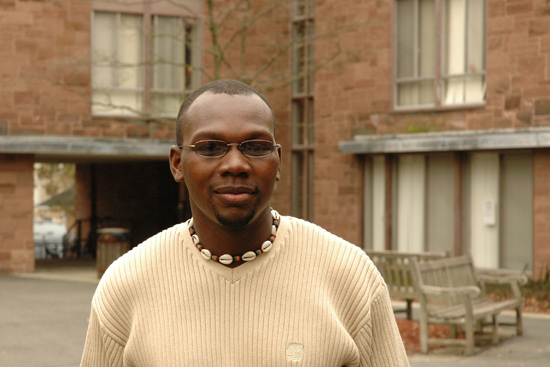Associate Director of McNair Program Prepares Students for Graduate Studies
 |
| Santos Cayetano, associate director of the McNair Program, works with first-generation college students to prepare them for graduate school. The program is located inside Butterfield B. |
| Posted 03/17/08 |
| Santos Cayetano has supported Wesleyan for years. He mentored students through the Upward Bound program and taught classes at the Great Hollow Wilderness School, an experimental education center formerly overseen by Wesleyan.
Now Cayetano is helping first generation college students from low-income families prepare for a successful post-graduate education experience through the Ronald E. McNair Post-baccalaureate Achievement Program. The McNair Program serves students who are first generation college students from low-income families or African-American, Hispanic, native American, native Hawaiian or Pacific Islander. Students interested in pursuing a PhD in any field may apply. As the new associate director of the program, Cayetano encourages these students to pursue academic excellence. “Ultimately, my goal is to help McNair fellows complete their master’s degrees and hopefully their Ph.Ds,” says Cayetano, who was hired Feb. 25. Laurel F. Appel, director of the McNair Program, says Cayetano is already making progress with the McNair students. Santos has met with students and held information sessions in his office and at Usdan with students interested in the program, Appel notes. As the newest member of the Student Academic Resource Network, he is quickly getting up to speed on all the members of the network, and how to assist students in making use of them. Cayetano advises students to consider the McNair Program “as soon as they start thinking about going to graduate school, he says. During their preparatory years, frosh and sophomores are called McNair Scholars. The McNair program puts emphasis on teaching Scholars about Ph.D options, how and why one might go about earning a doctorial degree. The program also helps students choose an academic direction and prepare for active research. All fields of research are eligible for the program but the focus is on the fields of math or science. After their sophomore year, students can become McNair Fellows. Students are matched with a faculty mentor who will oversee their progress and research. All Fellows receive a stipend. The program is able to support 25 fellows and 25 scholars each year. “A major part of preparing for graduate research is to get involved in research as an undergraduate, so the focus in the last two years is on doing research with Wesleyan faculty working toward a thesis or senior paper,” Cayetano explains. In addition the stipend and faculty mentoring, Fellows are provided with mutually-supportive mentoring groups and educational workshops on various topics related to graduate school. The program also offers waivers or fee-offsets for graduate application fees and opportunities to attend regional or national McNair conferences where students present their work and network with members of other McNair programs. The Scholars and Fellows also encouraged to attend McNair Research Talks. This year, Appel spoke on Getting Involved in Research while at Wesleyan: Professors, Projects, Funding, Internships; Tim Ku, assistant professor of earth and environmental sciences spoke on The Biogeochemistry of Freshwater Lakes and Tropical Coasts: Implications for Cultural Eutrophication and Bioluminescent Bays; Ishita Mukerji, associate professor of molecular biology and biochemistry spoke on How Do Fibers Form in Sickle Cell and Alzheimer’s Disease? Insights from Spectroscopy; and Hilary Barth, assistant professor of psychology, spoke on Abstract Number and Arithmetic in Preschool Children. In the near future, McNair students will also participate in talks about their own research experiences. The McNair staff also includes Appel; Donna Thompson, director of the Upward Bound Program and McNair Grant Principal Investigator; and Valerie Marinelli, administrative assistant. Partners in providing services for students in Butterfield B315 are Jim Donady, director of the Health Professions Partnership Initiative and professor of biology; Renee Johnson-Thornton, associate coordinator of the Mellon Mays Undergraduate Fellowship; and Alice Hadler, International Student Affairs Writing program, and Language service for non-native speakers. Santos really impressed the search committee with his history of working with students from first generation college/low income families, helping them define goals they might not have considered, and then mentoring them as they achieve those goals, Appel says. Prior to Wesleyan, Cayetano was senior program director of the Ralphola Taylor Community Center YMCA in Bridgeport, Conn. where he oversaw all programming, budgeting, facility, maintained and built community relations, grants writing and compliance; while supervising a staff of nine direct reports and 51 indirect reports. Prior to the Taylor Center, he was a regional director at Nutmeg Big Brothers Big Sisters, working closely with student volunteers from the University of Connecticut-Waterbury, Post University and Naugatuck Community College in becoming mentors and community leaders. At Great Hollow, he worked with students on team-building, and getting them to confront challenges that were at the outer limits of their confidence. I worked with Wesleyan students there, as beginning teachers and as clients, and I always wanted a position where I could again work directly with students, he says. Cayetano was born in Honduras, grow up in Belize, and went to middle school and high school in the Bronx, New York. He majored in sociology at Buffalo State College. He has two children, Hazanni, 7, and Izabella, 2. In addition spending time with his children, Caytano has several hobbies away from Wes. “I love playing soccer, camping, sitting by the ocean, hiking, learning about the social structure of our society, and providing opportunities for others to achieve while developing myself, he says. For more information on the McNair Program or to apply, go to: http://www.wesleyan.edu/mcnair/. |
| By Olivia Drake, The Wesleyan Connection editor |

